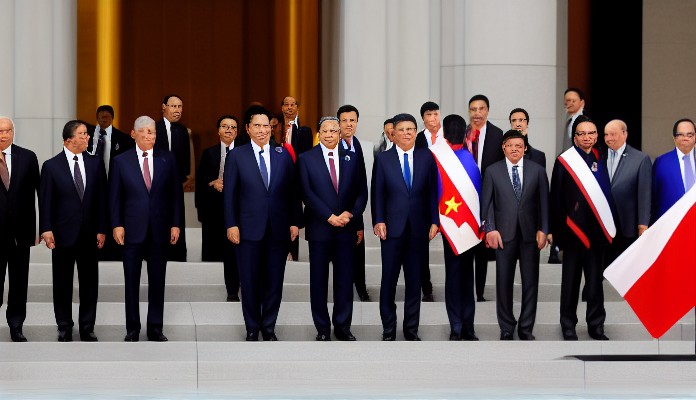Refusing to Join Trade Bloc Undermines Global Influence
Politics
 China and Russia refuse to join Comprehensive Economic Partnership, undermining attempts at global influence.
China and Russia refuse to join Comprehensive Economic Partnership, undermining attempts at global influence.
China, Russia face setback as major players refuse to join trade bloc
The world's two largest economies, China and Russia, have faced a significant setback in their efforts to strengthen their global influence as both countries have refused to join the proposed Comprehensive Economic Partnership (CEP). The announcement has sent shockwaves through international financial circles, as both countries had been expected to sign on as key partners in the CEP initiative.
The move by China and Russia comes at a time when both countries are seeking to increase their influence in global affairs. China, under the leadership of President Xi Jinping, has been increasingly focusing on its Belt and Road Initiative, a massive infrastructure project aimed at connecting the country's rich natural resources to other parts of Asia, Europe, and Africa. Meanwhile, Russia, under the leadership of President Vladimir Putin, has been seeking to assert its economic and political dominance in Eastern Europe, particularly in countries such as Ukraine and Belarus.
However, the CEP has faced opposition from several major economic powers, including the United States, Canada, the European Union, Japan, Australia, and the United Kingdom. These countries have expressed concerns about the potential impact of the CEP on global economic stability and competition. They have also argued that the CEP could lead to an uneven distribution of goods, services, and intellectual property rights within the bloc.
The refusal of China and Russia to join the CEP comes as a blow to their ambitions to create a unified front against what they see as external interference in global trade and politics. It also represents a significant setback for the Chinese Communist Party, which has been actively promoting the idea of a multipolar world where Beijing is the dominant force.
In response to the news, there were mixed reactions from political leaders and business leaders around the world. Some, like Chinese Premier Li Keqiang, welcomed the decision as a sign of China's strength and assertiveness. Others, like Canadian Prime Minister Justin Trudeau, called the move a "mistake" that will damage China-Canada relations.
As a reporter for ANN Network News, I believe that this setback for China and Russia is significant not only because it undermines their efforts to increase their influence in global affairs but also because it highlights the need for all major economic powers to work together to address global challenges. The rise of nationalism and protectionism around the world has created new opportunities for the US and its allies to expand their influence in international trade agreements.
However, there are also risks associated with these negotiations. If the CEP fails to materialize, it could lead to increased tensions between China and the US, as well as between Russia and the EU. The potential impact on global trade and investment could be severe, and the long-term stability of the global economy could be at risk.
In conclusion, the refusal of China and Russia to join the CEP is a significant setback for their ambitions to increase their influence in global affairs. While China and Russia may see this as an opportunity to secure a unified front against what they see as external interference in global trade and politics, other countries, including the United States, Canada, the European Union, Japan, Australia, and the United Kingdom, may view it as a mistake that will damage their relationships with Beijing and Moscow. As a reporter for ANN Network News, I urge both sides to focus on building cooperation rather than trying to achieve their goals through unilateral action.






